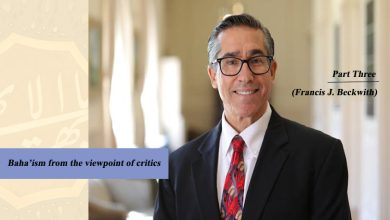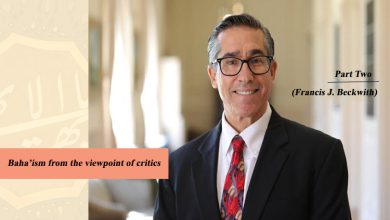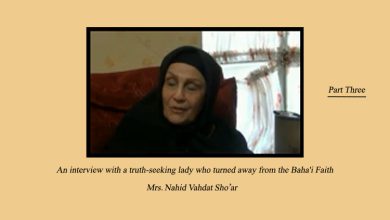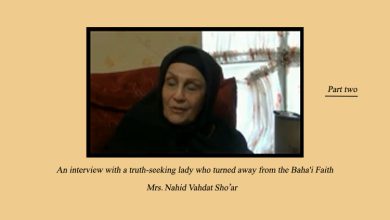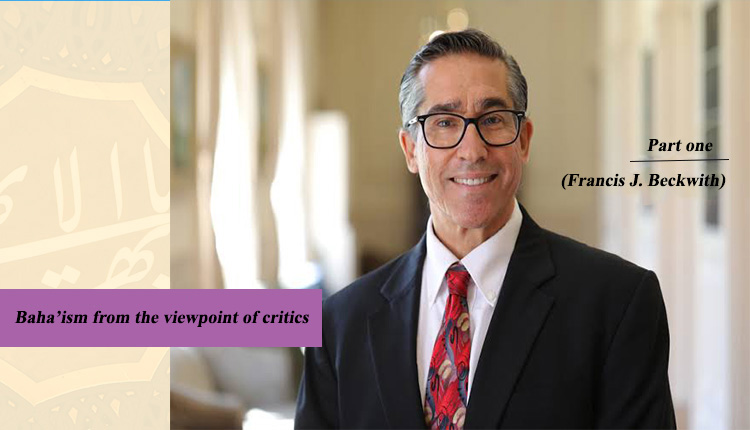
Summary
Francis Beckwith , born in 1960 in New York, is an American philosopher, researcher, speaker, writer and lecturer. Currently, he is a professor of Philosophy, Political Science, Religion-Government Studies, Comparative Studies of Religions, and Vice-Chancellor of the Philosophy Graduate Program at Baylor University. A condensed version of Beckwith’s 1984 master’s thesis was published as a book in 1985 titled “Baha’i: A Christian Response to Baha’ism”. Beckwith considers Baha’ism as an opportunistic cult focused on political power. In his research about Baha’ism, he has discussed the following points and evaluated Baha’ism by presenting Baha’i views and reciprocally Christian beliefs and documents:
*Denial of the special nature of the birth and mission of Jesus Christ and the physical ascension and physical return of Christ.
*Commentary on the opinion of Abdul Baha and the Baha’i missionaries and attributing weak and illegal content to the books of the Old and New Testaments to prove that Baha’u’llah is the Heavenly Father and/or the return of Jesus Christ in a physical and new form!
*The inner contradiction of the theological claims of the Baha’i leaders about the divine manifestations and their teachings.
* Baha’ism has no new message for modern and civilized human. Its possible appropriate literature and rulings have been adopted from the teachings and rulings of Abrahamic religions, and the specific Baha’i rulings have a medieval and uncivilized aspect. Therefore, although the Baha’is have translated their preaching pamphlets into more than 800 popular and local languages, but they strongly prevent translation of the Baha’i holy book – Kitab-e Aqdas – which is considered as the only heavenly book of Mirza Hossein Ali Nouri and for the next 9 centuries, in the golden age of Baha’i rule over the whole world, as the life-giving laws of human society!
Introduction
Since the emergence of the Baha’i faith, the teachings of this school of thought have always been subject to criticism and various objections have been raised against it. By writing various books, Muslim and Christian scholars and in general the supporters of divine religions have brought the most scientific criticism to the Baha’i religion and its teachings – which considers itself the evolved stage of Islam and divine religions. In addition to the supporters of monotheistic religions and religious thinkers, Baha’ism has also been criticized strongly by non-theistic writers and thinkers, and each of them has criticized the originality and teachings of these Iranian innovations and raised serious objections to it.
By assassinating the character and labeling the opponents and accusing them of being illiterate, unfamiliar with Baha’i concepts, ambitious and hostile, or anti-Baha’i and mercenary, the Baha’i organization is trying to reduce the impact of critics’ words on Baha’is and discredit their words, and of course, so far, they have achieved many successes in this path and have been able to create deep gaps between the Baha’i masses and the informed people and critics of Baha’ism and cut off the communication between Baha’is and the opposition.
By rejecting and invalidating the books and articles of the critics, the Baha’is are trying to make their research look small and somehow keep them away from the eyes of experts and researchers. The Baha’i organizations refer researchers and those interested in the Baha’i field only to books and pamphlets authored by Baha’i leaders and missionaries; while these manifestos were written in a biased and selective manner and were published after audit and correction by the national Baha’i circles and Bait-ul-Adl or the House of Justice, they usually lack documented evidence and contradict historical facts and they are more like a promotional teaser and brochure than a scientific and research work.
In the field of reviewing and criticizing Baha’ism, (in addition to Muslim scholars), Christian writers and researchers have also been pioneers and have published valuable research while studying and reviewing Babism and Baha’ism.
At first, it was thought that Christianity, considering the belief angle it has with Islam, viewed Baha’ism as an aligned cult and did not oppose it, but soon the Christians of the world realized the fact that Baha’ism not only poses a danger of deception for Muslims; It will also be a cause of concern and a problem for the followers of other divine religions, culturally, socially and politically. Thus, some Christian thinkers did not tolerate the missionary efforts of the Baha’is and tried to confront their missionary and developmentalist and mainly political goals.
On the other hand, the Baha’i community tried to present its existence as safe and in the way toward world peace with the slogan of inter-religious unity, but by examining the Bábí- Baha’i history and studying its teachings, it becomes clear that the Baha’i organization not only considers Baha’u’llah to be the return of Christ, but also seeks to achieve ambitious goals, such as “creating a single global Baha’i government” and “confiscating the savior and promise of divine religions.” Such deceptive movements of the Baha’i organizations caused Christian thinkers to think about enlightenment and try to expose the true face of the leaders of the cause and the deviant teachings of the Baha’i to the eyes of researchers and Christian believers.
Among the well-known Christian researchers who conducted studies in the field of Baha’i and tried to publish various books and articles, we can mention the names of Professor Edward Brown, William McElwee Miller, Francesco Fitcchia, Herman Zimmer, Samuel Graham Wilson and Francis Beckwith.
This series of articles tries to outline and review the opinions and views of some Christian critics. However, it is necessary for other educated researchers to enter this field and provide more complete articles to those interested in this field. It is necessary to remember that the scientific expression of Christian critics’ opinions about Baha’i does not mean accepting and confirming other religious, social, political opinions and views and their practices.
From the point of view of Baha’i Science magazine, Baha’ism is not a divine religion; Rather, it is a power-oriented social and political group (cult) and therefore its thoughts and teachings cannot be accepted.
Biography
Francis “Frank” Beckwith (born November 3, 1960 in New York) is an American philosopher, professor, researcher, speaker, author, and lecturer. He is currently Professor of Philosophy, Political Science, Religion-Government Studies, Comparative Studies of Religions, and Associate Professor of the Graduate Program in Philosophy at Baylor University, where he first served as Associate Director of Baylor’s J. M. Dawson Institute of Church-State Studies.
Beckwith teaches in the fields of ethics, philosophy of law and politics, philosophy of religion and jurisprudence in the field of religion and government. Beckwith is known for his legal and philosophical work on abortion and has appeared in several academic publications, including “In Defense of Life” (published by Cambridge University Press, 2007) and Politically Correct Death (published by Baker Publishing Group,1993) argues about this. Beckwith has also published several books that examine current philosophical issues in religion, law, and politics. His book, Taking Rites Seriously: Law, Politics, and the Reasonableness of Faith (Cambridge University Press) won the American Academy of Religion’s 2016 Book Award for Excellence in the Study of Religion in the category of Constructive-Reflective Studies.
He returned to the Catholic Church of his youth in May 2007, after decades of following the Evangelical Protestant Church. This prompted him to write a book titled Return to Rome: Confessions of an Evangelical Catholic, published by Brazos Press. This book, along with Scott Hahn’s Rome Sweet Home, is considered a major work of “Catholic theology.”
Francis Beckwith received a BA in Philosophy from the University of Nevada. Beckwith then earned his master’s in theology from Simon Greenleaf University in Anaheim, which merged with Trinity International University in Illinois in 1996. He received his PhD from Fordham University (PhD and M.A. in Philosophy) and his LL.M. from Washington University School of Law (St. Louis).
Bethany House published a condensed version of Beckwith’s 1984 master’s thesis on the Baha’i faith as a book, Baha’i: A Christian Response to Baha’ism, in 1985.
In 2001, Beckwith completed his dissertation on incorporating intelligent design into the public school science curriculum. In 2003, Rowman and Littlefield Publishing Group published a revised and expanded version of his thesis, Law, Darwinism, and Public Education: The Establishment Clause and Challenge of Intelligent Design.
Before joining Baylor University in July 2003, he was a Visiting Scholar (2002-2003) in the James Madison Program at Princeton University’s School of Politics. He was also a full-time professor of philosophy (1996-1989) and assistant professor of philosophy (1997-1996) at the University of Nevada, Whittier College, and an associate professor of philosophy, culture and law at Trinity International University (2002-1997).
Beckwith has also held two endowed research opportunities: Senior Visiting Fellow at the Nicola Center for Ethics and Culture at the University of Notre Dame (2009-2008) and Visiting Scholar in Conservative Thought and Politics at the Benson Center for the Study of Western Civilization, Thought, and Politics at the University of Colorado (2016-2017).
In November 2006, Beckwith became the 58th president of the Evangelical Theological Society. In May 2007, just one week after returning to the Catholic Church, he resigned from his presidency and membership. Over a decade later, he became the 90th president of the American Catholic Philosophical Association. From 1995 to 2007, he was a member of the Center for Bioethics & Human Dignity.
Subsequently, he published works criticizing intelligent design and genetic manipulation of reproduction, including chapters in Taking Rites Seriously, in 2015, and Never Doubt Thomas: The Catholic Aquinas as Evangelical and Protestant, in 2019. He currently resides in Texas with his wife.
His colleagues and students know him as an excellent teacher. On April 25, 2006, Baylor College awarded him a scholarship for “outstanding scholarly contributions.” In November 2004, the faculty of Baylor University introduced him as one of the distinguished faculty members. Students at Trinity Graduate School (California campus) selected him as Professor of the Year for the 1997-98 academic year. During his seven years at the University of Nevada, he received the Award of Merit (presented by the Office of Multicultural Student Affairs) in 1995 and was a finalist for University Teaching Awards in 1991, 1992, 1993 and 1996.
Both colleagues and students have recognized him for teaching excellence. On April 25, 2006 he was awarded a certificate by Baylor’s undergraduate journal (The Pulse) for his “outstanding contributions to undergraduate scholarship.” In November 2004 he was recognized as a distinguished faculty member by Baylor University`s Mortar Board. The students of Trinity Graduate School (California campus) selected him Professor of the Year for the 1997-98 school year. During his seven years at UNLV he received a 1995 merit award (given by the Multicultural Student Affairs Office of UNLV), a professor of recognition award by the UNLV alumni association (1992), and was a finalist for university-wide and/or college-wide teaching awards in 1996, 1993, 1992, and 1991.
He has presented academic papers, chaired sessions, and offered commentaries at the conferences of a number of professional societies including the American Philosophical Association, the American Political Science Association, the Society of Christian Philosophers, the Evangelical Philosophical Society, the American Bar Association (Science & Technology Section), the Christian Legal Society, the Evangelical Theological Society, the American Academy of Religion, the Southwestern Political Science Association, the Society of Catholic Social Scientists, the University Faculty for Life, and the Conference on Faith and History. He has served on the executive committees of both the Society of Christian Philosophers (1999-2002) and the Evangelical Philosophical Society (1998-2003, 2015-2017). The 2018 President of the American Catholic Philosophical Association, he served as the 58th President of the Evangelical Theological Society (November 2006-May 2007) as well as a member of the American Philosophical Association’s Committee on Philosophy and Law from 2005 through 2008.
Beckwith’s written works
His articles have been published in a number of academic journals including Harvard Journal of Law & Public Policy; San Diego Law Review; Synthese; International Philosophical Quarterly; Nevada Law Journal; Public Affairs Quarterly; Notre Dame Journal of Law, Ethics & Public Policy; Journal of Law & Religion; American Journal of Jurisprudence; Hastings Constitutional Law Quarterly; Chapman Law Review; Journal of Medicine & Philosophy; Social Theory & Practice; Journal of Law, Medicine, & Ethics; Journal of the Evangelical Theological Society; Cleveland State Law Review; Santa Clara Law Review; Christian Bioethics; Ethics & Medicine: An International Journal of Bioethics; Josephinum Journal of Theology; Journal of Church & State; Sacred Tribes Journal; University of St. Thomas Journal of Law & Public Policy; Human Life Review; Journal of Social Philosophy; Studies in Christian Ethics; Journal of Libertarian Studies; Journal of Medical Ethics; Ratio Juris; Logos: A Journal of Catholic Thought and Culture; The Southern Baptist Journal of Theology; The Heythrop Journal; Catholic Social Science Review; and Philosophia Christi.
Professor Beckwith has been quoted in a variety of publications including the New York Times, the Dallas Morning-News, the Washington Post, the Wall Street Journal, Christianity Today, World Magazine, the Las Vegas Review-Journal, the Las Vegas Sun, the Chronicle of Higher Education, the Los Angeles Times, the Waco Tribune-Herald, the Washington Times, Touchstone Magazine, the National Catholic Register, Commonweal, Moody Magazine, Christian Research Journal, the Baptist Standard and the Salt Lake Tribune.
Among the books in which his writings appear as chapters are:
–The Achievement of David Novak: A Catholic-Jewish Dialogue
-A History of Apologetics: A Biographical and Methodological Introduction
–Do Christians, Muslims, and Jews Worship the Same God? Four Views
-Philosophy: The Quest for Truth
-Political Philosophy and the Claims of Faith: Reason, Revelation, and the Civic Order
-Today’s Moral Issues: Classic and Contemporary Perspectives
-Contemporary Moral Arguments: Readings in Ethical Issues
-Journeys of Faith: Evangelicalism, Eastern Orthodoxy, Catholicism, and Anglicanism
-Persons, Moral Worth, and Embryos: A Critical Analysis of Pro-Choice Arguments
-What’s Wrong? Applied Ethicists and Their Critics
-The Rationality of Theism
-Bio-engagement: Making a Christian Difference Through Bioethics Today
-In Defense of Miracles: A Comprehensive Case for God’s Action in History
-Philosophy: The Quest for Truth
-Taking Sides: Clashing Views on Controversial Political Issues
Beckwith’s view of Baha’i beliefs and teachings
In view of Francis Beckwith’s field of thought and education – Christian theology, religion and politics, philosophy, ethics and comparative studies of religions – it is clear that in this field, he examined and criticized the central teachings and the main texts written by Baha’i leaders. His most important work in criticizing Baha’i is his master’s thesis entitled: “Baha’i, A Christian response to Baha’ism, the religion which aims toward one world government and one common faith.”
The book has an introduction and six chapters, along with some notes and a bibliography. Beckwith writes in the preface:
In times when doubt and uncertainty are praised and pessimism is considered a virtue, a serious discussion about religious truth is more or less considered a form of tolerable negation…! Blind people, looking for illusory black cats in a dark room!” Although this way of thinking is characteristic of our secular age, I, like Socrates, will not succumb to this popular way of thinking. History tells us that masses of people have been wrong, usually in the past (remember, for example, the theory of the flat earth) and there is no reason to think that our age and period in history is an exception. For this reason, I write this criticism of Baha’i with openness and courage and, without shame, I defend Christianity.
In this book, we examine two aspects of the Baha’i religion: the main Baha’i teachings (theoretical theology) and the Baha’is’ use of the Bible and citing it to defend their beliefs (Baha’i reasoning). In addition, we answer a few questions about the relationship between Christianity and Baha’ism: First, can we introduce the teachings of Jesus Christ into Baha’i teachings and beliefs, without damaging the original and true meaning of Christian teachings? Second, is the Baha’is’ use of the Bible successful, correct, justified, and legal? And finally, does Baha’ism have an objective reason for its beliefs and claims? What about Christianity? Is there a difference between the two? We intend to give clear and adequate answers to these questions.
The chapters of the book are as follows:
Chapter 1: A History of the Baha’i Faith
Chapter 2: A Presentation of Baha’i DogmaticsChapter 3: A Critique of Baha’i DogmaticsChapter 4: The Baha’i Use of the BibleChapter 5: On the Truth of Christianity
Chapter 6: Conclusion
notes
Suggested bibliography
In the next parts of this article, a summary of the parts of the book is presented.
Part Two
Part Three


